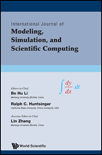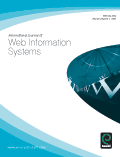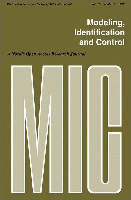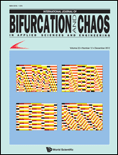
Journal of Physics-Complexity
Scope & Guideline
Pioneering Open Access Research in Complexity and AI
Introduction
Aims and Scopes
- Complex Networks and Graph Theory:
Research on the structure and dynamics of complex networks, utilizing graph theory to understand connectivity, community detection, and network robustness. - Statistical Physics in Complex Systems:
Application of statistical physics principles to study emergent behaviors in complex systems, including phase transitions and critical phenomena. - Dynamical Systems and Chaos:
Investigation of chaotic dynamics, bifurcations, and stability in various systems, with a focus on understanding transient behaviors and synchronization. - Modeling and Simulation Techniques:
Development of new modeling approaches, including agent-based models and computational simulations, to explore complex interactions in socio-economic, ecological, and technological systems. - Interdisciplinary Applications:
Integration of concepts from physics, biology, social sciences, and economics to address complex challenges, demonstrating the journal's commitment to cross-disciplinary research. - Machine Learning and Data Science:
Utilization of machine learning techniques to analyze complex datasets, enhance predictive modeling, and improve understanding of complex interactions.
Trending and Emerging
- Complex Adaptive Systems:
Research increasingly focuses on complex adaptive systems, exploring how agents interact and adapt within dynamic environments, which is crucial for understanding ecological and social phenomena. - Resilience and Robustness in Networks:
There is a growing emphasis on studying resilience and robustness in complex networks, particularly in response to external perturbations and failures, which is vital for infrastructure and ecological sustainability. - Epidemiological Modeling:
The journal has seen a surge in studies related to epidemiological modeling, especially in light of global health challenges, demonstrating the relevance of complex systems theory in understanding disease dynamics. - Data-Driven Approaches:
Emerging themes include the application of data-driven methods, such as machine learning and AI, to uncover patterns and insights in complex systems, enhancing predictive capabilities and understanding. - Interconnected Systems and Globalization:
Research focusing on the interconnectedness of global systems, including economic and environmental networks, is trending, reflecting the complexities of globalization and its impacts.
Declining or Waning
- Traditional Linear Models:
There has been a noticeable decline in research focused on traditional linear modeling approaches as the journal increasingly emphasizes non-linear dynamics and complex interactions. - Basic Statistical Analysis:
Research that relies solely on basic statistical methods without incorporating complex system dynamics or network structures has become less frequent, reflecting a shift towards more sophisticated analytical techniques. - Single-Disciplinary Studies:
Papers focusing exclusively on a single discipline without interdisciplinary connections have waned, indicating a trend towards integrating multiple fields to address complex problems. - Static Network Models:
Research centered on static representations of networks is declining, with a growing emphasis on dynamic and evolving network structures that better represent real-world complexities. - Overly Simplistic Agent-Based Models:
Simplistic agent-based models that do not account for significant interactions or complexities are becoming less favored, as the journal seeks more nuanced and detailed modeling frameworks.
Similar Journals

JOURNAL OF COMPUTER AND SYSTEMS SCIENCES INTERNATIONAL
Pioneering Insights in Computer and Systems SciencesJOURNAL OF COMPUTER AND SYSTEMS SCIENCES INTERNATIONAL, published by PLEIADES PUBLISHING INC, serves as a vital platform in the fields of Applied Mathematics, Computer Networks and Communications, Computer Vision and Pattern Recognition, Control and Systems Engineering, Information Systems, and Software among others. Established in 1993, the journal offers insights into both theoretical and practical advancements within these disciplines, continuously evolving through to 2024. Its current impact is reflected in its Q3 rankings across multiple categories in 2023 and Scopus rankings that position it within the 15th to 33rd percentiles, showcasing its relevance within the academic community. While not an Open Access journal, it maintains accessibility through institutional subscriptions, ensuring that researchers and professionals can engage with high-quality content. The journal is instrumental for those looking to deepen their understanding and contribute to ongoing discourse in computer science and systems sciences, making it an essential resource for students, researchers, and industry practitioners alike.

Networks and Heterogeneous Media
Connecting Ideas, Advancing ScienceNetworks and Heterogeneous Media is a distinguished journal published by the American Institute of Mathematical Sciences (AIMS), focusing on the dynamic interplay of networks across various interdisciplinary fields including applied mathematics, computer science, and engineering. With a diverse and robust scope, the journal aims to facilitate the advancement of knowledge regarding complex systems and heterogeneous media through the publication of cutting-edge research. The journal has exhibited notable academic impact, currently positioned in Q2 and Q3 quartiles across several key categories such as applied mathematics, engineering, and statistics, indicating its relevance and influence within the scientific community. Researchers and professionals exploring intricate mathematical models, computational applications, and statistical methodologies will find Networks and Heterogeneous Media an invaluable resource for both foundational studies and innovative applications. The journal regularly publishes high-quality articles, contributing to emerging discussions and developments in a rapidly evolving field.

Journal of Systems Science & Complexity
Fostering Interdisciplinary Collaboration in Systems Science.The Journal of Systems Science & Complexity, published by SPRINGER HEIDELBERG, stands as a leading forum for innovative research in the fields of computer science and information systems. With an ISSN of 1009-6124 and an E-ISSN of 1559-7067, this journal has established itself within the academic community, garnering a commendable impact factor that reflects its influential contributions. Operating from 2006 and continuing through 2024, it is categorized in the Q2 quartile for both Computer Science (Miscellaneous) and Information Systems, indicating its quality and relevance. Recognized within Scopus rankings, it places 52nd out of 133 in its specific field, affirming its significance in advancing systems science discussions. Researchers and professionals will find a wealth of knowledge through rigorous peer-reviewed articles that explore complex systems and their applications, enabling readers to stay at the forefront of technological advancements and interdisciplinary collaboration.

International Journal of Modeling Simulation and Scientific Computing
Advancing the Frontiers of Simulation and ComputingThe International Journal of Modeling Simulation and Scientific Computing, published by WORLD SCIENTIFIC PUBL CO PTE LTD, is a pivotal resource in the realms of Computer Science Applications and Modeling and Simulation. With an ISSN of 1793-9623 and an E-ISSN of 1793-9615, this journal serves as a platform for innovative and high-quality research from 2010 to 2024, contributing to the advancement of methodologies and applications in various scientific fields. Although currently categorized in the Q4 quartile for both recognized domains and positioned in the 42nd and 36th percentiles in the Scopus rankings for Mathematics and Computer Science respectively, the journal encourages scholarly exchange and fosters the integration of modeling and computational analysis in scientific research. Researchers, professionals, and students alike will find this journal an essential tool to stay updated with trends, methodologies, and cutting-edge findings in simulation and computational techniques that drive scientific inquiry today.

International Journal of Web Information Systems
Fostering collaboration in the world of information systems.The International Journal of Web Information Systems is a distinguished publication dedicated to advancing the field of web information systems, offering a platform for high-quality research and innovative practices. Published by EMERALD GROUP PUBLISHING LTD in the United Kingdom, this journal has established itself as a vital resource for researchers, practitioners, and academics from various disciplines, particularly in Computer Networks and Communications and Information Systems, as evidenced by its ranking in the 2023 quartile assessments (Q3) and Scopus rankings. With an H-index reflecting its impact within the academic community and a publication window spanning from 2005 to 2024, the journal is committed to fostering scholarly exchange and collaboration. While it currently does not have open access options, it provides valuable insights and breakthroughs that are essential for professionals and students navigating the ever-evolving digital landscape.

MODELING IDENTIFICATION AND CONTROL
Pioneering Practical Solutions for Tomorrow's ChallengesMODELING IDENTIFICATION AND CONTROL is a prominent academic journal dedicated to the fields of Computer Science Applications, Control and Systems Engineering, Modeling and Simulation, and Software. Published by MIC in Norway, this open access journal has been providing valuable insights and innovative research since 1980, promoting the free dissemination of knowledge. With a reputation reflected in its 2023 quartile rankings—Q3 in Computer Science Applications, Q2 in Control and Systems Engineering, and Modeling and Simulation, as well as Q3 in Software—this journal plays a vital role in advancing theoretical and practical solutions within its disciplines. Researchers and professionals benefit from its rigorous peer-review process and impactful publications, fostering collaboration and the exploration of emerging technologies across various applications. The journal's continual commitment to excellence is exemplified by its active presence in Scopus, where it maintains respectable rankings in relevant engineering and computer science subcategories, supporting its goal to be a pivotal resource for scholarly communication and practical advancements.

INTERNATIONAL JOURNAL OF BIFURCATION AND CHAOS
Charting New Territories in Mathematical DynamicsINTERNATIONAL JOURNAL OF BIFURCATION AND CHAOS is a premier scholarly publication renowned for its focus on the intricate dynamics of bifurcation and chaotic systems across various scientific disciplines. Established in 1996 and published by World Scientific Publishing Co Pte Ltd, this journal plays a significant role in fostering interdisciplinary research within the realms of applied mathematics, engineering, and modeling & simulation, boasting impressive quartile rankings of Q1 in Multidisciplinary studies and Q2 across other key categories as of 2023. With an active convergence of cutting-edge research and comprehensive reviews, this journal engages with the academic community by providing a platform for novel findings and theoretical advancements. Researchers, professionals, and students alike will benefit from its rich content, reflecting the ever-evolving landscape of complexity science. Access to the journal is subscription-based, ensuring a curated selection of high-impact articles that adhere to the highest standards of academic excellence.

Nonlinear Phenomena in Complex Systems
Transforming Insights into Nonlinear ChallengesNonlinear Phenomena in Complex Systems, published by BELARUSSIAN STATE UNIV, JOINT INST POWER & NUCLEAR RESEARCH, is an emerging platform dedicated to advancing the understanding of nonlinear phenomena within complex systems. With an ISSN of 1561-4085 and an E-ISSN of 1817-2458, this journal serves as a vital resource for researchers spanning the fields of mathematical physics and statistical and nonlinear physics. While classified within the Q4 quartile for both disciplines as of 2023, we encourage authors to submit impactful research that addresses the intricacies and challenges presented by complex systems, which are pivotal in various scientific applications. Targeting an international audience, including researchers, professionals, and students, the journal aspires to foster collaboration and innovation by offering open access to its insightful articles. With a converged publication timeline from 2009 to 2024, Nonlinear Phenomena in Complex Systems is poised to become a significant contributor to the evolving dialogue around nonlinear dynamics and their implications across multiple scientific domains.

EUROPEAN PHYSICAL JOURNAL B
Championing High-Quality Research for a Global AudienceEUROPEAN PHYSICAL JOURNAL B (ISSN: 1434-6028, E-ISSN: 1434-6036), published by Springer, is a prominent international journal based in Germany that focuses on the fields of Condensed Matter Physics and Electronic, Optical and Magnetic Materials. With a converged publication timeline from 1998 to 2024, it caters to a diverse audience that includes researchers, professionals, and students striving for the latest advancements in these vital areas of physics. The journal is recognized with a Q3 ranking in both relevant categories for 2023, showcasing its solid yet notable standing within the academic community. Although currently without an H-index, its Scopus rankings reflect a percentile performance of 41st and 39th, respectively, indicating a growing influence among its peers. The journal offers open access options, ensuring that groundbreaking research is widely accessible and contributes to the collective knowledge within the scientific domain. By aiming to publish high-quality, well-researched articles, the EUROPEAN PHYSICAL JOURNAL B plays a crucial role in disseminating innovative findings and fostering collaboration in the field of physics.

JOURNAL OF STATISTICAL PHYSICS
Illuminating the pathways of theoretical developments in physics.The Journal of Statistical Physics, published by Springer, is a premier academic journal that has made significant contributions to the fields of Mathematical Physics and Statistical and Nonlinear Physics since its inception in 1969. With a strong reputation reflected in its 2023 rankings—placing it in Q2 of both categories and achieving an impressive Scopus rank of #22 in Mathematical Physics and #25 in Statistical and Nonlinear Physics—this journal serves as a vital platform for researchers, professionals, and students. The impact factor of the journal underscores its importance in disseminating cutting-edge research and theoretical developments. Authors are invited to submit original research articles that explore the intricate complexities of statistical mechanics, quantum physics, and related disciplines, fostering deep insights and academic discourse. Although the journal does not currently offer open access, its robust editorial standards and commitment to advancing knowledge make it an essential resource for those engaged in these dynamic fields.